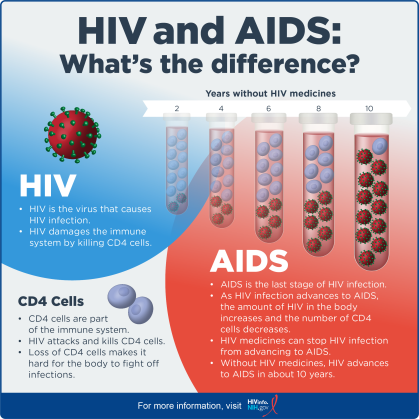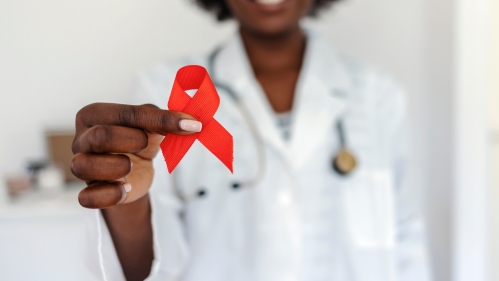
Robert Wood Johnson AIDS Program
Message to the Community
To our community,
Despite major strides, HIV/AIDS remains a major health problem in the United States. The Robert Wood Johnson AIDS Program has been at the forefront of the battle against AIDS since the first cases of AIDS were described in New Jersey. Responding to the evolving epidemic, the program’s focus has shifted from a primary pediatric one to a much broader family centered one. To this end a robust, comprehensive, multidisciplinary Women’s HIV Care Program has been established in collaboration with Robert Wood Johnson Medical School's Division of Adult Infectious Disease. Over the past two years, the program has also developed a collaboration with state funded Counseling and Testing Sites to provide Rapid HIV Testing to youth and women presenting in high-risk medical settings as well as in community settings. Since 2012, the program has expended its adult services to include men and transgender individuals. The expansion also includes transitioning older perinatally infected patients to on-sit Adult ID providers. Since 2017, we have become a PrEP (pre-exposure prophylaxis) program, in addition to the HIV counseling and testing. PrEP is a pill for those at high risk for HIV. Responding to the global epidemic, many program members have served in clinics outside the United States to provide both service and much needed training of medical care providers. Our goal is to expand our HIV/AIDS international activities in the ensuing months and years. We strive as a program to continually remain at the forefront of this epidemic responding to the emerging needs of the patient, thus maintaining our prominence as a well-respected and comprehensive HIV care and treatment center and as a resource for the State of New Jersey.
A major contributor to our program's success has been the dedication of each member of our care team, who have made invaluable contributions to improve the lives of our patients. Most importantly, we are grateful to our patients who have faced and overcome many adversities and who have allowed us to serve them and become an ever so small part of their lives as they deal with the challenges of living with HIV/AIDS.
Our Mission
The Robert Wood Johnson AIDS Program (RWJAP) is committed to providing comprehensive, multidisciplinary care to children, adolescents, women, and families, infected and affected by HIV, in a family centered environment with respect, compassion, and the highest standards of excellence. The program is dedicated to advancing the field of HIV care and prevention through patient services, research, education, and advocacy, and remains actively involved in the development of health care policies affecting children and families living with HIV.
The Robert Wood Johnson AIDS Program is:
- A joint program of Rutgers University and Robert Wood Johnson University Hospital
- A member of RWJ Barnabas Health serving New Jersey and surrounding areas
- A regional HIV treatment center designated by the New Jersey Department of Health and Senior Services, Special Child Health Services
- One of seven sites in the Ryan White Part D Statewide HIV Family Centered Network, which has been successful in reducing the perinatal transmission rate to less than 2 percent statewide
- Working in collaboration with the Middlesex County Department of Human Services/ Office of Human Services--Addiction Services Ryan White Part A Program, the Division of Child Protection and Permanency, and Central Jersey health care providers to provide care and treatment to HIV infected and affected families
Our History
In 1983 the identification of the first cases of Pediatric AIDS in New Jersey led to the establishment of RWJAP (then known as the Central New Jersey Pediatric AIDS Program.) Since its inception, RWJAP has been at the forefront of providing comprehensive, culturally sensitive, multidisciplinary care and treatment to children and youth with HIV/AIDS. Between 1983 and 1986 the program underwent steady growth with greater numbers of children enrolled each year. To date, RWJAP has enrolled over 1,000 children and their families. Over the years, RWJAP’s operational program has undergone an evolution due to the availability of state and federal funds in response to the changing face of the HIV epidemic in the US.
Between 1988 – 1990 three major changes occurred:
- A Clinical Research Program was started with federal funding from the NIH to sponsor Pediatric AIDS Clinical Trials;
- A partnership with the Division of Youth and Family Services was developed;
- In partnership with the New Jersey Department of Health and Senior Services Title IV HIV Care Network, RWJAP became one of seven HIV care sites in a network established to provide care and treatment to HIV infected children.
These collaborations provided the basic infrastructure for RWJAP to provide comprehensive, multidisciplinary HIV specialty care, which included specialized nursing and social work services.
In 1990, RWJAP’s services were further expanded when additional funding became available through the Middlesex County Title II AIDS Consortium and the New Jersey Department of Health and Senior Services Title IV as a result of the authorization of the Ryan White Care Act.
In subsequent years, two major clinical advances yielded a shift in the care and treatment of HIV affected children offered by RWJAP:
- In 1994, a national research trial (ACTG 076) for HIV infected pregnant women reported that the mother to child transmission of the HIV virus could be dramatically interrupted with the use of Zidovudine during pregnancy, labor and delivery, and the six week neonatal period. This led to the implementation of a Perinatal Collaborative Project with area hospitals including St. Peter’s University Hospital and RWJUH. A direct outcome of this collaboration and approach was a dramatic decrease in the birth of HIV infected infants.
- The advent of protease inhibitors in 1996 sparked the use of combination therapy called “highly active anti-retroviral therapy” (HAART). Since the virus could now be controlled, the course of HIV disease changed from a universally fatal illness to a chronic illness. As a result of the use of HAART, the RWJAP patient population began to experience an increase in longevity, a reduction in hospital days, and a decrease in morbidity.
Due to the above outlined changes in the Perinatal HIV environment, the services and focus at RWJAP were redirected to meet the needs of its “aging-up” perinatally infected population and to provide additional services to HIV infected pregnant and non-pregnant women.
In 1997, the tri-county area of Middlesex, Somerset, and Hunterdon counties was classified an “eligible metropolitan area” (EMA) by the federal government qualifying it to receive Ryan White Title I HIV care funding. The EMA designated RWJAP a specialized Women, Infant, and Children’s Youth Initiative.
In 1998, the New Jersey Title IV HIV Care Network expanded its role to include care of women with a focus on providing care to hard to reach women. In response, RWJAP established an on-site co-located Women’s Clinic, and in 2001, developed a collaborative relationship with a Trenton-based Title III program to provide on-site case management and care for women and children. RJWAP also reinforced it’s long standing relationship with Rainbow House, a residential facility for HIV infected teenage females located in Trenton, by increasing the medical care and consultative services it provided to residents.
Due to this new direction and refocused effort between 1998 and 2004, the following trends continue:
- Decreasing the number of newly infected infants.
- Increasing the numbers of women entering the program.
- Increasing the number of youths cared for in the program. This was due in part to “aging up” of the perinatally infected children and also to increasing outreach to and enrollment of newly identified behaviorally infected youth.
Between 2002 – 2005, as epidemiological data suggested an increased need for case finding, attention was refocused and funding was secured for HIV education and outreach to youth in high risk settings, as well as, risk reduction, case finding and linkage to care. With the advent of improved technology and availability of an accurate and reliable rapid HIV testing, a new initiative was begun to test women and youth in the RWJUH Emergency Department in 2005.
RWJAP’s history and longevity, as well as its linkages and collaborative working relationships within the community and the Robert Wood Johnson Health Network make it uniquely qualified to provide care and treatment for patients with HIV/AIDS. As part of UMDNJ-Robert Wood Johnson Medical School, RWJAP maintains a commitment to teaching and research, and works tirelessly toward the goal of providing comprehensive, state of the art care, treatment and services to the children in New Jersey with HIV/AIDS.
HIV vs AIDS: What's the difference?
Our Integrative Care Model
Robert Wood Johnson AIDS Program's multidisciplinary team provides family centered, comprehensive care** to HIV infected families
- From program entry, every patient is assigned a care team: Physician, Psychologist, Pediatric Nurse Practitioner, Nurse Case Manager, Family Case Manager
- Care team provides medical care, medical case management and psychological and psychosocial services
- **"Human immunodeficiency virus (HIV) antiretroviral agents and effective HIV care management transformed HIV disease from a death sentence to a chronic condition for many in the United States. A comprehensive HIV care model was developed to meet the complex needs of HIV patients, with support from the Ryan White program, the Veterans Administration, and others. This paper identifies the essential components of an effective HIV care model. As access to health care expands under the National HIV/AIDS Strategy and the Patient Protection and Affordable Care Act, it will be critical to build upon the HIV care model to realize positive health outcomes for people with HIV infection." Read more.
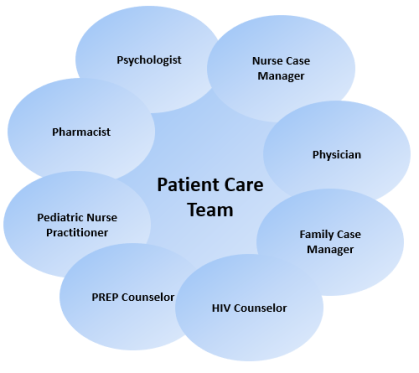
Program Services
- One-stop shop medical home model for HIV infected patients
- Pediatric/Adolescent HIV Clinical Program
- Adult Patient HIV Clinical Program
- Mental Health Services and Screening
- High Risk OB Perinatal HIV Collaborative
- HIV Testing and PrEP Services
- Pediatric Resident Rotation with Adolescent Specialist
- RWJMS Student Activities: HIPHOP, PAIR, DISC
- Outreach Activities: Community education and HIV testing
Advancements in HIV Care & Prevention
- Combination medications with less pill burden improves adherence
- Reduction of mother to child transmission
- One pill once a day regimens
- Genotype/Phenotype resistance testing for medication resistance and sensitivity
- Improved quality of life
- Rapid HIV testing with results in 15 minutes
- Treatment as Prevention
- Pre-exposure Prophylaxis ( PrEP)
- Undetectable = Untransmissible
- Injectable Long Acting Antiretrovirals
- Injectable PrEP
Five Patient Categories
- Perinatally HIV Infected Infant/Child/Youth birth – 24 yrs of age and followed until 26 years of age or longer with Peds ID
- HIV Exposed Infants birth to 6 to 12 months
- HIV Infected Women and Men: Collaboration with RWJMS Adult ID Physicians and Dept. of OB/GYN for pregnant patients
- Behaviorally -Acquired Individuals including young adults
- Affected Family Members— parent, extended family members, siblings, guardians.
New Jersey Statewide - Family Centered HIV Care Network
- FXB Center - Rutgers-School of Nursing Newark
- Newark Beth Israel Medical Center - Newark
- Jersey City Medical Center - Jersey City
- St. Joseph’s Hospital and Medical Center - Paterson
- Robert Wood Johnson AIDS Program - Robert Wood Johnson Medical School New Brunswick
- Jersey Shore Medical Center - Neptune
- Cooper Hospital/University Medical Center - Camden
Services We Provide
- 10+ Birth Control Methods - used to prevent a pregnancy, provided by highly trained nurses, doctors, and counselors who will help you decide which method is best for you.
- Sexually Transmitted Infections (STI) Testing - STIs are infections spread from one person to another during sexual or intimate contact. Our staff will give you a simple test and if you have an STI you will get the treatment you need.
- Other Services - Pap smears, pregnancy testing, counseling and referrals, infertility screening & referral, and pelvic & breast exams.
Who can get family planning services?
Anyone who is old enough to get pregnant, or interested in birth control methods regardless of your age, income or insurance status can get family planning services. The services are completely confidential. Teens can come on their own, they do not need permission from anyone.
Do I need insurance, how much will it cost?
You do not need insurance to get any of the family planning services. Nobody will be turned away, everyone will get the care they need, regardless of their ability to pay or insurance status.
Contact Us
If you have any questions or would like to schedule an appointment, call us at: 732-253-3949 Services we provide: All services are confidential.
PrEP vs. PEP
PrEP (pre-exposure prophylaxis) and PEP (post-exposure prophylaxis) are methods for preventing HIV that involve taking HIV medicines. When you take steps to protect yourself against a disease, like HIV, it's called prophylaxis.
PrEP and PEP are for people who don't have HIV, but are at risk of getting it.
PrEP & HIV Prevention
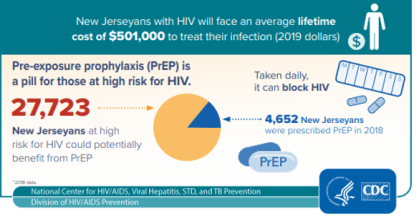
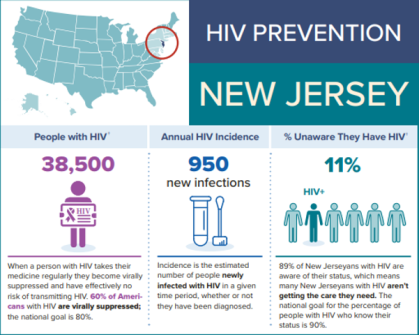
Perinatal HIV Project
Regional Perinatal Center (BMSCH/ RWJUH)
- On-site points of entry for patients
- High Risk OB Clinic (BMSCH)
- Maternal Fetal Medicine Practice RWJMS)
- UMG OB/GYN Practice
- Labor and Delivery Unit
- RWJAP provides pre-delivery support for HIV infected women outpatient settiing
- Perinatal HIV Collaborative Group meets monthly-patient care management meetings (Adlut ID, OB, Peds, Peds ID, MFM and HROB Nurses, Perinatal C.N.S.)
- Policy development for Rapid HIV test in labor and delivery
Perinatal Care Coordination
- Pregnant patients are referred by various providers (Chandler, community)
- Nurse Case Manager attends prenatal visits with patient at RWJBH HROB Clinic
- Mother’s antiretroviral treatment is reviewed and side effects monitored
- Medication adherence is reviewed weekly
- Mother’s viral load is closely monitored by Peds ID physicians to assess newborn risk
- HROB –Maternal Fetal Medicine providers participate in case conferencing to assess delivery status
- Perinatal Summary form is sent to RWJ Peds Chiefs, General Peds Attending, Labor and Delivery by email
- EPIC Order Process for HIV exposed Infants and HIV Exposed Infant Protocol provided
What You Can Do if You are Pregnant and Have HIV
- Visit your health care provider regularly.
- Take HIV treatment as prescribed to stay healthy, protect your partner, and protect your baby.
HIV treatment reduces the amount of HIV in the body (viral load) to a very low level. This is called viral suppression or an undetectable viral load.*
Getting and keeping an undetectable viral load is the best thing you can do to stay healthy and prevent transmission to your baby. - The risk of transmitting HIV to your baby can be 1% or less if you:
Take HIV treatment as prescribed throughout pregnancy and delivery.
Give HIV medicines to your baby for 2 to 6 weeks after birth. - If your HIV viral load is not low enough, a cesarean delivery can help prevent HIV transmission.
- The only option that eliminates risk of postnatal transmission of HIV to the baby is infant formula or pasteurized donor human milk. The PROMISE Study showed that keeping an undetectable viral load through pregnancy labor and delivery and breast/chestfeeding substantially reduces the risk of transmitting HIV through breast/chestfeeding to less than 1%.
If you have HIV, do not pre-chew food for your baby.
*Viral suppression is defined as having less than 200 copies of HIV per millimeter of blood. An undetectable viral load means having a viral load so low that a test can't detect it. The benefits of having an undetectable viral load also apply to people who stay virally suppressed.
Psychosocial Services
Each patient, as well as their affected family members, is offered psychosocial services by RWJAP’s psychologist and family case worker. A psychosocial assessment is performed upon entry into care to determine the patient/family needs and is reassessed at subsequent medical visits. The following services are offered to patients and their families:
- Adherence evaluation for medication compliance
- Individual counseling sessions
- Mental status screenings for anxiety and depression, as well as other mental health difficulties
- Referrals to outside mental health agencies and psychiatrists
- Assistance with financial/medical benefits; state and federal programs; social services and legal issues.
Educational / Vocational Services
RWJAP’s Mental Health Services team provides guidance and support to patients and families regarding their educational needs. The Program Psychologist, a Licensed Psychologist and Certified School Psychologist, reviews patient’s current reports, refers for testing as appropriate and along with patient and family, determines a treatment plan.
Educational/Vocational Services include:
- Patient advocacy
- One-to-one educational/vocational planning sessions
- SAT and college application assistance
- Referrals to appropriate educational/vocational services and agencies.
Family Case Management
The Robert Wood Johnson AIDS Program’s Nurse Case Managers and the Program's Family Case Manager provide nurse case management services for HIV infected and exposed infants, children, youth, and their families. HIV exposed infants are followed for 18 months while HIV infected children and youth are followed from diagnosis through the continuum of their disease process. The medical and psychological needs and medical management of the HIV infected children and youth are intricate and complex. They require close monitoring of lab work, imaging studies, and complex medication regimens and medication adherence. Due to the increased longevity of the perinatally infected children and adolescents their psychosocial needs must be addressed. Their normal growth and development is confounded by their disease process, complexities of disclosure, medication adherence, and confounding manifestations of the disease itself which require a multidisciplinary approach.
Transitional Services
Today, HIV/AIDS is considered a chronic illness and perinatally infected children enjoy longevity. Currently pediatric HIV care extends to youth 24 years of age. The goal of transition is for these older youth to transition their care to Adult Providers. This transition period begins in the early to mid-teen years providing patients with experience as disease managers. It is RWJAP’s experience that the HIV+ pediatric population require continued “intensive case management and psychosocial support” through this transition phase.
Learn more about Service Standards Medical Case Management - Ryan White HIV/AIDS Treatment Extension Act of 2009
-
Includes information about eligibility, requirements and standards
PROUD Gender Center of New Jersey
At Robert Wood Johnson University Hospital (RWJUH) New Brunswick it is a top priority to optimize health and well-being for every patient. Our LGBTQIA Program is firmly rooted with that purpose in mind.
In full support of the transgender community, RWJUH provides a full suite of specialized services designed to bring you to the best “you” you can be.
At the Center, a multidisciplinary team of family medicine physicians, gynecologists, urologists, endocrinologists, plastic surgeons and otolaryngologists provides specialized care for LGBTQ patients. Hormone therapy and surgical procedures are offered to support the transition of transgender patients.
Services PROUD Provides
- Comprehensive primary care
- Gender-affirming surgery including transfeminine and transmasculine top surgery
- Gender-affirming bottom surgery for transmen
- Facial feminization and facial masculinization surgery
- Hormone therapy/endocrinology
- Gynecology/urology
- Otolaryngology/vocal training
- Community outreach, education and training
- Advocacy resources
- Information and referral to behavioral and mental health support services
- Support services
To complement our services, our LGBT Health Navigators can assist with any questions that you may have and help guide you through your experience.
Contact Us
1-833-BH-PROUD (1-833-247-7683)
181 Somerset St., 2nd Floor
New Brunswick, NJ 08901
Make a Donation
A gift to the Robert Wood Johnson AIDS Program can have a direct impact on the life of a child living with HIV/AIDS.
A donation of:
- $25 - will provide the money to purchase over the counter supplies not covered by insurance.
- $50 - will buy a food store gift card to offset the gas expenses to for families to travel back and forth from medical visits.
- $100-$150 - will purchase a food store gift card for groceries.
How to Donate
The Robert Wood Johnson AIDS Program has a designated fund managed by the Rutgers University Foundation. Please send your donation to the following:
Robert Wood Johnson Medical School
Department of Pediatrics
Robert Wood Johnson AIDS Program
1 Robert Wood Johnson Place, MEB Rm. 322
New Brunswick, NJ 08901
Attn: Christine Jurcsek, Grants Coordinator
Phone: 732-235-8504
Fundraising
If you are interested in organizing a fundraising event, contact Christine Jurcsek.

